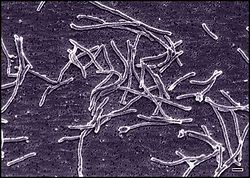A restriction enzyme, restriction endonuclease, REase, ENase or restrictase is an enzyme that cleaves DNA into fragments at or near specific recognition...
55 KB (5,856 words) - 08:25, 13 May 2025
In a restriction digest, DNA molecules are cleaved at specific restriction sites of 4-12 nucleotides in length by use of restriction enzymes which recognize...
6 KB (784 words) - 02:16, 13 March 2024
polymorphism itself, as detected through the differing locations of restriction enzyme sites, or to a related laboratory technique by which such differences...
9 KB (1,163 words) - 11:15, 11 February 2025
Endonuclease (redirect from Endonuclease enzyme)
regard to sequence), while many, typically called restriction endonucleases or restriction enzymes, cleave only at very specific nucleotide sequences...
25 KB (2,688 words) - 21:18, 21 November 2024
piece using Type IIS restriction enzymes and T4 DNA ligase. This assembly is performed in vitro. Most commonly used Type IIS enzymes include BsaI, BsmBI...
18 KB (2,496 words) - 18:18, 31 October 2024
restriction enzymes. These are generally palindromic sequences (because restriction enzymes usually bind as homodimers), and a particular restriction...
5 KB (642 words) - 01:58, 3 December 2024
Restriction enzyme mediated integration (abbreviated as REMI) is a technique for integrating DNA (linearised plasmid) into the genome sites that have been...
4 KB (426 words) - 07:50, 22 February 2024
such as that borne by bacteriophages. Bacteria have restriction enzymes, also called restriction endonucleases, which cleave double-stranded DNA at specific...
20 KB (2,668 words) - 02:28, 20 June 2024
sequences that immediately flank each instance of a particular restriction site of a restriction enzyme throughout the genome. Once RAD tags have been isolated...
13 KB (1,424 words) - 22:05, 2 December 2023
Thermus aquaticus (section Taq I restriction enzyme)
Thermus aquaticus arose at this time from the convention of giving restriction enzymes short names, such as Sal and Hin, derived from the genus and species...
15 KB (1,802 words) - 22:27, 5 February 2025
list of restriction enzymes whose names start with A and have a clearly defined cutting site. The following information is given for each enzyme: Name of...
80 KB (3,046 words) - 23:44, 27 August 2024
Palindromic sequence (section Restriction enzyme sites)
palindrome. Many restriction endonucleases (restriction enzymes) recognize specific palindromic sequences and cut them. The restriction enzyme EcoR1 recognizes...
7 KB (825 words) - 20:55, 9 December 2024
declarations Restriction enzyme, a type of enzyme that cleaves genetic material Restriction, a term in medieval supposition theory Restriction (mathematics)...
854 bytes (129 words) - 03:28, 9 September 2024
is designing complementary oligonucleotide sequences that contain restriction enzyme sites along with additional bases on the end that are complementary...
34 KB (3,833 words) - 21:07, 12 May 2025
EcoRI (category Restriction enzymes)
(pronounced "eco R one") is a restriction endonuclease enzyme isolated from species E. coli. It is a restriction enzyme that cleaves DNA double helices...
8 KB (891 words) - 05:50, 8 February 2025
A restriction map is a map of known restriction sites within a sequence of DNA. Restriction mapping requires the use of restriction enzymes. In molecular...
4 KB (613 words) - 06:50, 30 December 2023
from a biological sample (such as blood or tissue) is digested with restriction enzymes, and the resulting DNA fragments are separated by electrophoresis...
17 KB (2,313 words) - 02:30, 3 December 2024
A restriction enzyme or restriction endonuclease is a special type of biological macromolecule that functions as part of the "immune system" in bacteria...
8 KB (1,087 words) - 08:23, 12 September 2023
of the two types of enzymes responsible for phage growth restriction in Escherichia coli (E. coli) bacteria. One of these enzymes added a methyl group...
22 KB (2,538 words) - 09:39, 13 February 2025
HindIII (category Restriction enzymes)
(pronounced "Hin D Three") is a type II site-specific deoxyribonuclease restriction enzyme isolated from Haemophilus influenzae that cleaves the DNA palindromic...
10 KB (1,080 words) - 23:37, 5 February 2025
by restriction enzymes that break the molecule's phosphodiester backbone at specific locations, which themselves belong to a larger class of enzymes called...
9 KB (1,247 words) - 10:27, 17 November 2024
purified by size fractionation. Using a second enzyme, DNA ligase, fragments generated by restriction enzymes could be joined in new combinations, termed...
32 KB (4,017 words) - 04:13, 12 April 2025
genome-wide methylation profiles on a single nucleotide level. It combines restriction enzymes and bisulfite sequencing to enrich for areas of the genome with a...
13 KB (1,786 words) - 21:45, 7 April 2025
Isoschizomer (category Restriction enzymes)
Isoschizomers are pairs of restriction enzymes specific to the same recognition sequence. For example, SphI (CGTAC/G) and BbuI (CGTAC/G) are isoschizomers...
2 KB (245 words) - 04:50, 16 September 2023
example through the presence of restriction sites. The vector and the foreign DNA may be treated with a restriction enzyme that cuts the DNA, and DNA fragments...
20 KB (2,517 words) - 17:11, 5 November 2024
Zurich. In 1970, Smith and Kent W. Wilcox discovered the first type II restriction enzyme, which is now known as HindII. Smith went on to discover DNA methylases...
7 KB (638 words) - 16:23, 13 May 2025
studied restriction enzymes whose names start with O to R inclusive. It contains approximately 130 enzymes. The following information is given: Enzyme: Accepted...
41 KB (654 words) - 23:27, 19 January 2023
A restriction fragment is a DNA fragment resulting from the cutting of a DNA strand by a restriction enzyme (restriction endonucleases), a process called...
3 KB (363 words) - 02:41, 11 March 2023
most studied restriction enzymes whose names start with S. It contains approximately 130 enzymes. The following information is given: Enzyme: Accepted name...
40 KB (651 words) - 23:27, 19 January 2023
DNA shuffling (section Restriction enzymes)
recombination or the similarity of the DNA sequences, restriction enzymes which rely on common restriction sites, and nonhomologous random recombination which...
25 KB (2,913 words) - 04:36, 21 September 2023















